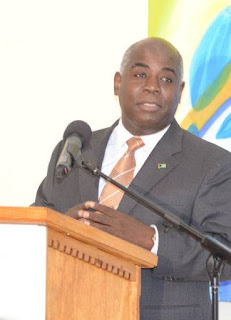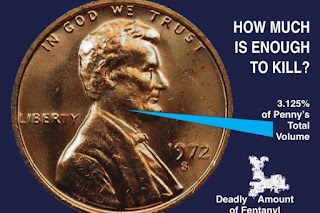Sounding the alarm on fentanyl
Allen warns that dangerous opioid is here
By Candia Dames is the executive editor of The Nassau Guardian
Fentanyl, the powerful synthetic opioid, is seldom, if ever, spoken about publicly in The Bahamas.Now, Dr. David Allen, the renowned Bahamian psychiatrist who headed the Taskforce Against Drugs in the 1980s when the crack cocaine epidemic brought The Bahamas to near ruin, is joining forces with mothers who have lost children to fentanyl to sound the alarm ahead of what he fears could eventually become a wave of fentanyl deaths.
As Allen repeatedly put it, “Being aware of it is life; unawareness is death.”
Allen has documented eight deaths in The Bahamas through his sources, including those in law enforcement and the families who have lost loved ones to the drug, which comes in various forms, among them powder, liquid and pill.
“What worries me now is this fentanyl thing, which is 100 times stronger than heroine and cocaine,” he said.
“You can chew it in gum, you can take it in powder form, you can take it in liquid form in your drink, so it potentiates or makes powerful any drug, whether it be Tylenol, Aspirin, Xanax, your anti-depressants, but even your Percocet, or Vicodin or Hydrocodone, Valium, anything, and the sad thing is it goes right for the respiratory center, slows your breath down.
“If you don’t get an antidote, which is Narcan, within a few minutes, you die. To my surprise, I’ve come across some Bahamians who died in the States, and as I look here, I know it’s here.”
Inspector Cyprian Collie, who is attached to Scientific Support Services (forensics lab) of the Royal Bahamas Police Force, said in terms of the number of cases confirmed in The Bahamas, “it’s roughly over a seven-year period and we have had six cases – two nationals and four non nationals”.
Collie said, “We are not at a crisis. We want to be abundantly clear because we don’t want to raise hysteria, but the concern is, what I hope we can emphasize, unlike other drugs, we don’t have the luxury of going through the crisis and being able to respond once it’s already here.
“We know it’s here, but because it’s so dangerous because it’s so lethal, if there is an incident or we do have a crisis, people just [will] die, so there won’t be any treatment and that sort of thing because that’s the nature of the drug, so that is our fear.”
While Collie said six confirmed fentanyl deaths in seven years is not an epidemic in The Bahamas, Allen said to his knowledge, local hospitals are not testing for fentanyl. He fears the actual death count could be notably higher.
“The police tell me their testing for fentanyl happens in a forensics way, but I need that testing to be done (in hospital),” he said.
“Anyone coming to the hospital knocked out should be tested for fentanyl. We had a massive 100,000 people dying in America last year.”
Collie said there have been cases in The Bahamas that have been labeled natural causes but fentanyl was involved.
He did not call any names, but one such case in The Bahamas was that of Andre Thompson, a 28-year-old man who died last August. His death certificate showed he died of cardiac arrest. A toxicology report confirmed fentanyl.
“About two and a half to three years ago, the first time I heard the word fentanyl, I was watching a movie,” his devastated mother, Andrea Johnson-Thompson, told The Nassau Guardian.
“I don’t remember the name of the movie and fentanyl was the main theme of the movie. The Lord showed me in my spirit a huge wave and he said fentanyl is coming and I never imagined. I never would have imagined. I never in a million years would have imagined that I would lose my son.”
Allen said he has heard that fentanyl is passing around at some local clubs, and Collie confirmed The Bahamas now has a pill culture.
A fact sheet made available by Allen’s office (with information from the websites of the Centers for Disease Control and Prevention and UC Davis Health) notes that fentanyl is a synthetic opioid made in a lab and is 50 to 100 times more powerful than morphine.
It is approved to treat severe pain, typically acute traumatic pain and advanced cancer pain, according to the CDC. Fentanyl is widely used in emergency departments and hospitals. It can also be prescribed. However, the recent fentanyl-related deaths are linked to illegally made drugs.
Fentanyl has also been found mixed with other drugs, including heroin, counterfeit pills, methamphetamine (meth) and cocaine, or even replacing them entirely.
The fact sheet continues: Due to its potency, a relatively small amount of fentanyl can be deadly. Just two milligrams can cause overdose or death. It is very powerful and can be addictive. Fentanyl cannot be smelled or tasted, making it nearly impossible to tell if drugs contain or have been laced with the opioid without special fentanyl test strips. It is possible that six out of every 10 pills with fentanyl contain a potentially lethal dose.
According to the Drug Enforcement Administration (DEA) of the United States, illicit fentanyl, primarily manufactured in foreign clandestine labs and smuggled into the United States through Mexico, is being distributed across the US and sold on the illegal drug market.
The DEA noted drug trafficking organizations typically distribute fentanyl by the kilogram. One kilogram of fentanyl has the potential to kill 500,000 people.
The DEA seized more than 50.6 million fake pills in 2022 and more than 10,000 pounds of fentanyl. Fake prescription pills are easily accessible and often sold on social media, e.g. Snapchat and e-commerce platforms.
Collie said, “Quite frankly, especially in our drug culture, we don’t generally see a lot of persons who abuse opioid-type drugs in The Bahamas, so we’ve not had, for example, a heroin crisis.
“There are reasons for that, probably because people don’t like needles, but we don’t have people abusing opioids. I say that to say we don’t have persons who have developed any sort of tolerance to opioid type drugs, so in the event there is any type fentanyl, any type pill, it’s accidental or incidental, you’re going to have persons who just die.”
Grappling with tragedy
Johnson-Thompson, who has four other sons, is living with the reality that she will never see her son again.
Andre Thompson, affectionately known by his family and other loved ones as Dre, died in his apartment just next door to her home.
She recalled the shock and horror of the moment she was alerted he was dead.
“I didn’t know what to think,” said a tearful Johnson-Thompson.
“My son lay there lifeless. I didn’t know, I thought he would get up. He was laying there, but I was telling him to get up. I didn’t know why he was still. I was rubbing his chest and telling him to breathe. I said, ‘Dre, you’re not breathing, you’re not breathing’. I was screaming. So I didn’t know why he wasn’t getting up. I didn’t know what happened. I didn’t know why he wasn’t getting up.
“The death certificate said my son died of a heart attack. He had no known illness. My son never even accepted a Panadol from me if he had a headache or when he got his braces. I marvelled at that. He would just say, ‘Mommy, I’ll ride it out.”
Johnson-Thompson is appealing to parents to educate themselves and their children on the dangers of fentanyl.
She spent her son’s 29th birthday earlier this year in the cemetery.
“I am a mother who had to say farewell to my first born son,” Johnson-Thompson said.
“I am first and foremost a child of God, a woman of God. I’m the Lord’s servant and I raised my son very well. I raised him to know the Lord, to love God, to do his best, to serve the Lord. And for my son to die from ingesting a poison like fentanyl, all I can say is, we don’t know as mothers why our children make some decisions they make.
“A very real factor is fake friends, undercover agents of Satan in their lives who would make things available to them that they wouldn’t normally seek out and mothers especially of adult children who don’t live home under the same roof.
“On any given day, we don’t know the challenges our adult children face, how strong they have to be to say no. How they may be manipulated and lied to and how dangerous it is to have the wrong people to give access to your life; and obviously, my son paid the price of his life for it.
“He’s not here today because he accepted poison from someone he knew.
“My son Dre is not here today. My heart is shattered. His four younger brothers, their hearts are shattered. We are trying to cope minute by minute. I can’t even say day by day because it is a minute by minute journey and it’s extremely difficult and it’s nothing but the grace of God that has kept us so far, and that will keep us as we try to grapple with the fact that Dre is not here.”
Allen hopes the message will get out far and wide across The Bahamas so other mothers, fathers, families, do not have to experience the grief Johnson-Thompson and other parents are living.
At almost 80, Allen said he expects the fight against opioids in The Bahamas to be his last dance, career wise.
“It’s very, very, serious; this could wipe our country out very quickly because last year in the States, they had over 100,000 deaths and the sad thing is, the young people, they don’t want to die,” he said.
“They may want to have a nice time. It’s the highest high known to us, so we know when they get Narcanized, they go right back to get another hit and then when I heard about deaths of Bahamians in the States, and deaths here, I realized that now is the time to start the awareness; so I feel I’m right back in the 80s when I picked up the crack epidemic in my little house, Knowles House.
“In 1982, I had 32 cases; ‘83, 59 cases; ‘84, 560 cases. That exponential increase indicated an epidemic. I was not successful politically initially, but I found mothers who had lost a child and those mothers, their groaning from the womb taught me that I had to go public.”
Antidote
Allen said he is working with pharmacies to get Narcan Naloxone – the antidote – in The Bahamas in spray form.
“I’m trying to get it here. We have injectable Naloxone here, but I’m trying to get the spray. I’ve tried two pharmacies. One pharmacy has got it ordered for me, but it’s a little expensive, but I feel that every policeman should have the Narcan. Some school teachers should have it, but all our emergency services, doctors offices should have the spray,” he said.
“And as it gets worse, every parent should have it. I feel that for a small little country, it’s so dangerous for us not to be aware of this situation.”
Collie said while there is currently not a crisis, first responders should be armed with Narcan spray, as they are in the United States.
“As far as I am aware, we don’t have any of that in The Bahamas, so that’s something that I know the commissioner is interested in providing for first responders and police officers,” he said.
“It’s not terribly expensive. As I said, we don’t currently have a crisis, but it’s better to be prepared.”
Collie said none of the confirmed victims in The Bahamas was found alive and had a chance in hospital.
“We do need our first respondents to have the tool to combat a potential overdose,” he said, however.
Allen said he appreciates the fact that the police and impacted parents like Johnson-Thompson are willing to work to raise awareness.
“It’s not a time for panic,” he said.
“It’s a time for awareness. I’m not a policeman, but I am saying, please, Bahamians, we can get on top of this.”
Source






.jpg)
.jpg)
